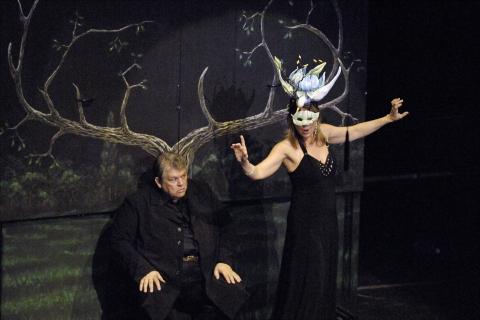|
<< -- 2 -- Kelly Ferjutz JOYOUS AND WELL-PACED

Generally, the women were stage left, the men stage right, with Falstaff as buffer in between. The singers had ample room for movement, complemented by the special lighting which could hide or display as required. The blue lighting which rimmed the upper portion of the stage, reflecting off the silvery ceiling produced an eerie moonlight effect in the final scene. For the most part, costumes were a variation on concert dress, although Falstaff wore a glorious white brocade coat with purple trim for his courting scene. There was one intermission, placed between scenes I and II of Act II, which worked very well.
Enough of the logistics -- it is, after all, the music that makes an opera come to life, and this one was very, very lively! From the first notes of the orchestral opening, it was joyous, happy and well-paced. It is, in every regard, an ensemble effort, although each singer does have solos, however brief. There were probably more beautiful, exposed solos from the orchestra than I recall, as well, and I'm quite certain that none of the singers -- for all their combined experiences in opera -- have never before had the pleasure of singing with such a marvelous orchestra. Of particular note (orchestra-wise) was the English horn solo by Jeffrey Rathbun early on, and the horns in the second half.
American bass-baritone Richard Sutliff was an impressive John Falstaff, who needed no extra padding to fill the large part. He projects a beautiful sound at each end of his wide vocal range, even in the falsetto parts. As an actor, his gestures and facial expressions matched the music, demonstrating the blow-hard Falstaff as well as the humble one.

Richard Sutliff as Falstaff (seated) and Cinzia Forte as Nannetta at Herne's Oak in Windsor Park, in Act III Scene 2 of Verdi's 'Falstaff'. Photo © 2006 Roger Mastroianni
|
Twyla Robinson as Alice Ford and Vladimir Chernov as her husband were marvelously suited to the roles and to each other. Mr Chernov was especially effective as an actor; his completely-at-ease stage presence combining with little throw-away gestures that added significantly to his dual roles as both Brook and Mr Ford. Their daughter Nannetta was beautifully sung by the young Italian soprano Cinzia Forte in her US début. She was winsome and entirely convincing throughout, but especially in her aria telling of her love for Fenton, sung by the tenor Cataldo Caputo. He had perhaps the only true aria of the evening, his sonnet about love and kisses, etc, to Nannetta, which was gorgeously done. They were visually well-matched as well as vocally.
Continue >>
Copyright © 10 June 2006
Kelly Ferjutz, Cleveland USA

|

